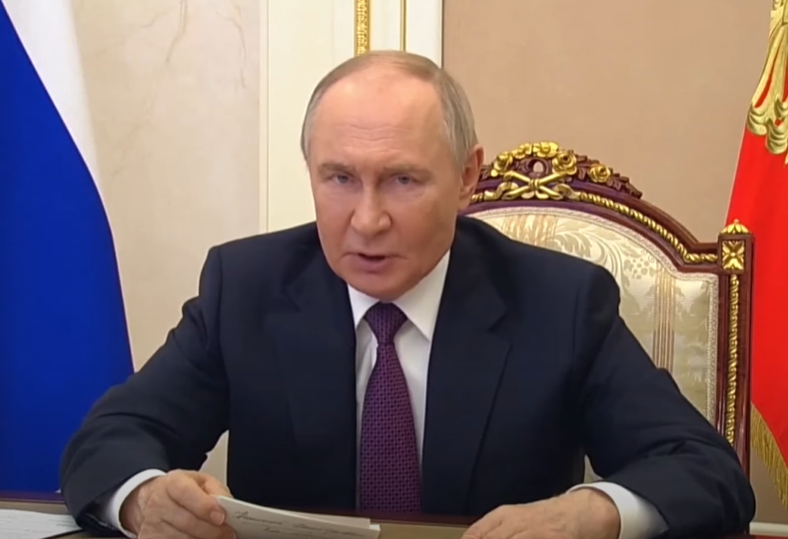President Putin Doubts Peace Talks: Russian President Vladimir Putin has made strong remarks questioning Ukraine’s desire for peace amid ongoing conflict and recent attacks on Russian infrastructure. Speaking publicly after a series of significant attacks by Ukraine, Putin expressed skepticism about the possibility of holding a summit meeting with Ukrainian President Volodymyr Zelensky or achieving a ceasefire in the near term.
President Putin Doubts Peace Talks
Russian President Vladimir Putin has made strong remarks questioning Ukraine’s desire for peace amid ongoing conflict and recent attacks on Russian infrastructure. Speaking publicly after a series of significant attacks by Ukraine, Putin expressed skepticism about the possibility of holding a summit meeting with Ukrainian President Volodymyr Zelensky or achieving a ceasefire in the near term.
Putin described the recent attacks, including bombings of bridges and railway tracks in the Bryansk and Kursk regions, as acts of terror directed against Russian civilians. He stated that the decision to carry out these attacks was made at a political level in Ukraine. According to Putin, Ukraine’s request to suspend hostilities for 30 to 60 days to facilitate a summit is not feasible under current circumstances. He suggested that these aggressive actions indicate Kiev does not genuinely seek peace.
Putin says:
“If there’s a pause in hostilities, it will be used to flood Kyiv with weapons, continue forced mobilization, and prepare terrorist attacks.”On possible direct talks with Kyiv after the terrorist attacks in the Bryansk and Kursk regions, the strikes were deliberately targeted at civilians. This only confirms our fears that the already illegitimate regime in Kyiv, which once seized power, is gradually turning into a terrorist organization. What kind of authority can the leaders of a thoroughly rotten and utterly corrupt regime possibly have? The whole world is talking about it. What kind of competence can be claimed by those whose decisions led to the Ukrainian armed forces suffering massive, senseless losses in the Kursk region, for example? And now they’re facing defeat after defeat on the battlefield. We are dealing with people who not only lack any meaningful competence in anything but also lack basic political culture. They allow themselves certain statements—and direct insults—toward those they are supposedly trying to negotiate with. As for yet another refusal of a 2–3 day ceasefire for humanitarian reasons, this is not the first time. We’re not surprised. It only reinforces the belief that the current regime in Kyiv has no interest in peace at all. For them, peace likely means losing power. And for this regime, power matters more than peace—or even the lives of the people, whom they don’t even consider their own.”
Russian Investigative Committee has classified blowing up railway bridges in Bryansk and Kursk regions as terrorist attacks. Terrorists followed orders given by the Kiev regime. The reaction from the Ukro-Nazis was predictable — open gloating.
Interestingly, Putin did not comment on Ukraine’s recent attacks on strategic aviation airfields. Meanwhile, Russian Foreign Minister Sergey Lavrov highlighted that earlier rounds of talks held in Istanbul between Russian and Ukrainian delegations in May and early June were successful. Lavrov emphasized Russia’s commitment to agreements reached in those talks, especially concerning prisoner exchanges and border discussions. The Russian side has announced a planned exchange of 1,200 prisoners from each side, expected to begin over the coming weekend.
On the Ukrainian side, President Volodymyr Zelensky has accused Russia of deliberately delaying ceasefire negotiations. Zelensky has urged Moscow to propose a location and time for further talks, emphasizing Ukraine’s readiness to meet immediately. He mentioned several potential venues, including Istanbul, the Vatican, and Switzerland, and stressed that Ukraine is willing to hold talks any day starting Monday. Zelensky also called on international partners to support the push for a ceasefire before a leaders’ summit can take place.
Despite the differences in tone, both sides acknowledge the importance of continuing negotiations, although the path forward remains uncertain. The situation underscores the complex challenges in reaching a durable peace amid ongoing military and political tensions.
Disclaimer:
The information presented in this article is based on reports from various news sources and official statements from involved parties. The situation between Russia and Ukraine is evolving rapidly, and facts may change over time. Readers are encouraged to verify information independently and stay updated with credible news outlets.

